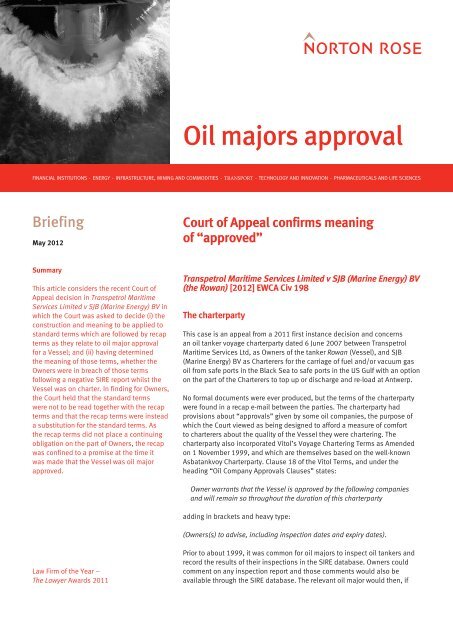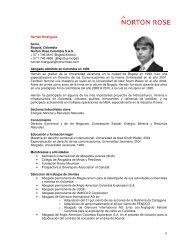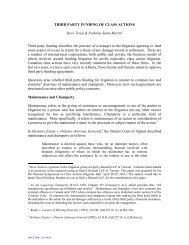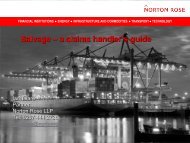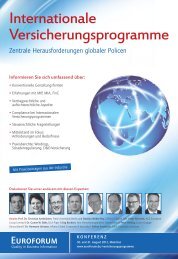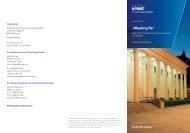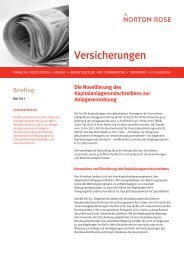Oil majors approval - Norton Rose
Oil majors approval - Norton Rose
Oil majors approval - Norton Rose
Create successful ePaper yourself
Turn your PDF publications into a flip-book with our unique Google optimized e-Paper software.
Briefing<br />
May 2012<br />
Summary<br />
This article considers the recent Court of<br />
Appeal decision in Transpetrol Maritime<br />
Services Limited v SJB (Marine Energy) BV in<br />
which the Court was asked to decide (i) the<br />
construction and meaning to be applied to<br />
standard terms which are followed by recap<br />
terms as they relate to oil major <strong>approval</strong><br />
for a Vessel; and (ii) having determined<br />
the meaning of those terms, whether the<br />
Owners were in breach of those terms<br />
following a negative SIRE report whilst the<br />
Vessel was on charter. In finding for Owners,<br />
the Court held that the standard terms<br />
were not to be read together with the recap<br />
terms and that the recap terms were instead<br />
a substitution for the standard terms. As<br />
the recap terms did not place a continuing<br />
obligation on the part of Owners, the recap<br />
was confined to a promise at the time it<br />
was made that the Vessel was oil major<br />
approved.<br />
Law Firm of the Year –<br />
The Lawyer Awards 2011<br />
<strong>Oil</strong> <strong>majors</strong> <strong>approval</strong><br />
FINANCIAL INSTITUTIONS ⋅ ENERGY ⋅ INFRASTRUCTURE, MINING AND COMMODITIES ⋅ TRANSPORT ⋅ TECHNOLOGY AND INNOVATION ⋅ PHARMACEUTICALS AND LIFE SCIENCES<br />
Court of Appeal confirms meaning<br />
of “approved”<br />
Transpetrol Maritime Services Limited v SJB (Marine Energy) BV<br />
(the Rowan) [2012] EWCA Civ 198<br />
The charterparty<br />
This case is an appeal from a 2011 first instance decision and concerns<br />
an oil tanker voyage charterparty dated 6 June 2007 between Transpetrol<br />
Maritime Services Ltd, as Owners of the tanker Rowan (Vessel), and SJB<br />
(Marine Energy) BV as Charterers for the carriage of fuel and/or vacuum gas<br />
oil from safe ports in the Black Sea to safe ports in the US Gulf with an option<br />
on the part of the Charterers to top up or discharge and re-load at Antwerp.<br />
No formal documents were ever produced, but the terms of the charterparty<br />
were found in a recap e-mail between the parties. The charterparty had<br />
provisions about “<strong>approval</strong>s” given by some oil companies, the purpose of<br />
which the Court viewed as being designed to afford a measure of comfort<br />
to charterers about the quality of the Vessel they were chartering. The<br />
charterparty also incorporated Vitol’s Voyage Chartering Terms as Amended<br />
on 1 November 1999, and which are themselves based on the well-known<br />
Asbatankvoy Charterparty. Clause 18 of the Vitol Terms, and under the<br />
heading “<strong>Oil</strong> Company Approvals Clauses” states:<br />
Owner warrants that the Vessel is approved by the following companies<br />
and will remain so throughout the duration of this charterparty<br />
adding in brackets and heavy type:<br />
(Owners(s) to advise, including inspection dates and expiry dates).<br />
Prior to about 1999, it was common for oil <strong>majors</strong> to inspect oil tankers and<br />
record the results of their inspections in the SIRE database. Owners could<br />
comment on any inspection report and those comments would also be<br />
available through the SIRE database. The relevant oil major would then, if
<strong>Oil</strong> <strong>majors</strong><br />
02 <strong>Norton</strong> <strong>Rose</strong> LLP May 2012<br />
satisfied, issue an <strong>approval</strong> of the Vessel. The <strong>approval</strong>s would be dated and<br />
would often be expressed to be valid for a particular period of time and thus<br />
have an expiry date and which the Owners could write in to any contract. All<br />
of this was contemplated by the Vitol Terms of 1999.<br />
The practice outlined above changed following the pollution incidents<br />
involving the tankers Erika in 1999 and Prestige in 2002, largely as both<br />
tankers had been “approved” by oil <strong>majors</strong> and this led to damaging<br />
publicity for the oil <strong>majors</strong> concerned. Whilst it continued to be the practice<br />
of oil <strong>majors</strong> to issue reports through SIRE, together with the issuing of letters<br />
reflecting “<strong>approval</strong>”, these were now issued in more guarded terms and<br />
often stated that blanket <strong>approval</strong> had not been granted and should not be<br />
assumed by other parties.<br />
In this case the Lukoil <strong>approval</strong> for the Vessel stated as follows:<br />
“We have now received sufficient information with regard to this vessel and<br />
will not normally require re-inspecting the vessel for a 12 month period from<br />
the date of the inspection.<br />
Please note, however, that this letter does not constitute a blanket <strong>approval</strong><br />
of the vessel for LUKOIL-LITASCO business or for visits to Lukoil terminals or<br />
facilities. The vessel will be screened by us on each occasion it is tended for<br />
Lukoil/Litasco business or intends to visit one of our terminals or facilities.<br />
Amongst other criteria, our decision will be based on the continued<br />
satisfactory performance of the vessel and any feedback that we may receive.”<br />
In the recap and under the heading “(VESSEL INFO)” it stated:<br />
“TBOOK WOG VSL IS APPROVED BY:–<br />
BP/LITASCO/STATOIL-EXXON VIA SIRE”<br />
and which, according to the Court understanding of the translation, reads:<br />
“To best of Owner’s knowledge, without Owner’s guarantee, vessel is<br />
approved by the oil companies [there identified, via the SIRE database]”<br />
Under the heading (“TERMS”) it states, inter alia:<br />
“VITOL VOYAGE CHARTERING TERMS – AMENDED 1ST NOVEMBER 1999”<br />
Each of the Vitol Terms is then referred to for the purpose of express<br />
inclusion, amendment, deletion or substitution as required by the parties.<br />
However, opposite number 18, the recap states:<br />
TBOOK VESSEL APPROVED BY:–<br />
BP/EXXON/LUKOIL/STATOIL/MOH
The facts<br />
After loading in the Black Sea the Charterers exercised their option to<br />
discharge and re-load in Antwerp. Whilst at Antwerp a Class inspection<br />
showed that the low suction sea-chest valve needed repair before the Vessel<br />
could sail. Notwithstanding the need for repair, Class subsequently issued<br />
an interim certificate permitting the sea-chest valve to be repaired at the<br />
next port and a Condition of Class was imposed. At the same time Shell was<br />
invited by the Owners to inspect the Vessel on the reasoning that if Shell<br />
“<strong>approval</strong>” could be obtained, it would represent a valuable asset in the<br />
marketing of the Vessel. Following inspection Shell filed a SIRE report which<br />
contained 33 adverse comments, none of which related to the sea-chest<br />
valve, and none of which produced a response from the Owners.<br />
The Charterers then made an agreement with Shell, subject to vetting, for the<br />
sale of the cargo. Shell subsequently said that the Vessel was not acceptable<br />
and that Shell had decided not to purchase the Charterers’ cargo. Despite<br />
the Owners pointing out that Shell was not listed among those oil <strong>majors</strong> as<br />
“approving” the Vessel, the Charterers said that they had no option but to<br />
sell the cargo elsewhere and claim the difference in price by way of damages<br />
from the Owners on the basis that the Vessel was not in a fit state to be<br />
approved by any oil company and, in particular, the companies identified in<br />
the recap e-mail containing the charterparty.<br />
The issues to be determined<br />
According to the Court there were three questions to be resolved:<br />
• What were the relevant terms of the charterparty?<br />
• What do those terms mean on their true construction?<br />
• Were the Owners in breach of those terms?<br />
What were the relevant terms of the charterparty?<br />
For the Court, the critical question was whether the provision numbered “18”<br />
in the recap e-mail was to be read together with the printed version of clause<br />
18 of the Vitol terms or in substitution of it. In this the Owners argued that<br />
express inclusion, amendment or deletion are not the same exercise as the<br />
substitution of one clause for another. In this the Court agreed with Owners,<br />
and pointed to a number of other examples in the charterparty in which the<br />
parties intended to substitute various clauses, including those headed “Bills<br />
of Lading/Indemnity Clause”, “Weather Clause” and the “Blending Clause”.<br />
The Court also took the view that as the recap e-mail contained a new title<br />
for clause 18, namely “TBOOK VSL APPROVED BY” instead of “<strong>Oil</strong> Company<br />
Approvals Clause”, and followed by “TBOOK VESSEL APPROVED BY: BP/<br />
EXXON/LUKOIL/STATOIL/MOH”, this discounted any argument that the<br />
parties intended the Vitol Clause 18 and the recap to be read together, but<br />
<strong>Oil</strong> <strong>majors</strong><br />
<strong>Norton</strong> <strong>Rose</strong> LLP May 2012 03
<strong>Oil</strong> <strong>majors</strong><br />
04 <strong>Norton</strong> <strong>Rose</strong> LLP May 2012<br />
rather buttressed the view that the recap was in substitution for the Vitol<br />
Clause 18.<br />
The Court also observed the difficulty that would be experienced in reading<br />
the recap clause and clause 18 of the Vitol terms together. In this the<br />
Charterers expressed the view that the collective reading of the recap and<br />
printed Vitol terms would read:<br />
Owner warrants that the vessel is approved by the following companies and<br />
will remain so throughout the duration of this Charterparty to the best of<br />
owner’s knowledge: BP/EXXON/LUKOIL/STATOIL MOH.<br />
According to the Court, this would be a difficult clause to construe, but in<br />
any event the concept of a “continuing warranty to the best of the owner’s<br />
knowledge” is a curious one and one that the Court did not believe the<br />
parties intended to agree.<br />
In this the Court held that clause 18 of the Vitol terms had been replaced by<br />
clause 18 of the recap, which also contained a reference to <strong>approval</strong>s under<br />
the heading “VESSEL INFO”, and it was these two terms which had to be<br />
construed together and without reference to the Vitol terms.<br />
What do those terms mean on their true construction?<br />
WOG<br />
Whilst the Owners argued that the “WOG” (without guarantee) under<br />
“VESSEL INFO” should also form a part of the new (substituted) clause 18,<br />
the Court disagreed. According to the Court, the Vessel info clause and<br />
clause 18 perform entirely different functions, despite both being concerned<br />
with oil company <strong>approval</strong>. The Vessel info clause constitutes the description<br />
of the Vessel and the information contained in it will normally be a condition<br />
of the contract entitling the Charterers to terminate the charterparty if the<br />
condition is not fulfilled. In this it is not surprising that the parties may wish<br />
to limit the obligation in relation to <strong>approval</strong> by saying that it is without<br />
guarantee, which the Court stated has a comparatively well settled meaning<br />
(namely that there is to be no liability in the absence of fraud or bad faith).<br />
In this the Court took the view that there was no reason to import that well<br />
settled meaning into clauses where the rubric “WOG” is not present.<br />
Notwithstanding the foregoing, the Court reiterated that:<br />
• clause 18 of the recap is different from clause 18 of the Vitol terms<br />
• the Vitol clause is an express continuing warranty of <strong>approval</strong> for the<br />
duration of the charterparty
• clause 18 of the recap has no such express continuing warranty<br />
and that on its true construction clause 18 of the recap is confined to a<br />
promise at the time when it was made.<br />
TBOOK<br />
According to the Court, the force of “TBOOK” (to the best of Owners<br />
knowledge), so far as voyage charterparties are concerned, is that that<br />
the Owners had first, and to the best of their knowledge, at the date of<br />
the charterparty, procured <strong>approval</strong>s from the named oil companies and<br />
secondly, that at the date of the charterparty, did not know of facts which<br />
would cause the Vessel to lose the <strong>approval</strong> of those oil companies in the<br />
course of the duration of the charterparty.<br />
Were the Owners in breach of those terms?<br />
In answering the question of whether the Owners were in breach of the above<br />
terms, the Court considered that there were two issues:<br />
• Was the Vessel approved by the named oil companies at the date of the<br />
charterparty?<br />
• Did the Owners know anything at that date which would cause the<br />
<strong>approval</strong> of the oil companies to be lost?<br />
Against the findings of the trial judge there was no dispute that the Owners<br />
had obtained the “<strong>approval</strong>s” of the named oil companies at the date of the<br />
charterparty. In this the trial judge noted:<br />
Despite the wording of the letters the evidence from both sides was virtually<br />
unanimous that the words “<strong>approval</strong>” in this context was taken, at least in<br />
2007, to mean not literally “<strong>approval</strong> by” but “acceptable to” and subject to<br />
further <strong>approval</strong>. Although it seems that some in the market prefer not to use<br />
the expression “<strong>approval</strong> letter” there is no doubt that the word “approved”<br />
in the clause is referring to such letters.<br />
Nor was there anything on the facts that at the date of the charterparty<br />
the Owners knew anything about the Vessel that would cause the named<br />
oil companies to disapprove the Vessel or alter the terms of the letters<br />
which they had given in relation to the Vessel. In other words, there was no<br />
suggestion that the Owners were aware of anything in early June 2007 which<br />
could have warned it of the impending events, let alone anything which<br />
would have caused any of the named oil companies to alter or cancel the<br />
terms of their letters of “<strong>approval</strong>”. On this basis the Court found in favour of<br />
the Owners and disallowed the damages claim by the Charterers.<br />
<strong>Oil</strong> <strong>majors</strong><br />
<strong>Norton</strong> <strong>Rose</strong> LLP May 2012 05
<strong>Oil</strong> <strong>majors</strong><br />
06 <strong>Norton</strong> <strong>Rose</strong> LLP May 2012<br />
Conclusion<br />
This case highlights the importance of Owners being conscious of the<br />
likely legal effect that any recap clause may have on the standard terms<br />
of a charterparty, irrespective of whether or not the terms are express or<br />
referenced by way of incorporation. It also illustrates the need to be fully<br />
cognizant of any onboard condition that may give rise to an adverse finding<br />
as a result of an oil major SIRE inspection.
Notes
nortonrose.com<br />
FINANCIAL INSTITUTIONS ⋅ ENERGY ⋅ INFRASTRUCTURE, MINING AND COMMODITIES ⋅ TRANSPORT ⋅ TECHNOLOGY AND INNOVATION ⋅ PHARMACEUTICALS AND LIFE SCIENCES<br />
Contacts<br />
If you would like further information<br />
please contact:<br />
Philip Roche<br />
Partner<br />
<strong>Norton</strong> <strong>Rose</strong> LLP, London<br />
Tel + 44 (0)20 7444 2609<br />
philip.roche@nortonrose.com<br />
Peter Glover<br />
Senior associate and master mariner<br />
<strong>Norton</strong> <strong>Rose</strong> LLP, London<br />
Tel + 44 (0)20 7444 2071<br />
peter.glover@nortonrose.com<br />
<strong>Norton</strong> <strong>Rose</strong> LLP<br />
<strong>Norton</strong> <strong>Rose</strong> LLP is a member of <strong>Norton</strong> <strong>Rose</strong> Group, a leading<br />
international legal practice offering a full business law service to many<br />
of the world’s pre-eminent financial institutions and corporations from<br />
offices in Europe, Asia, Australia, Canada, Africa, the Middle East, Latin<br />
America and Central Asia.<br />
The purpose of this publication is to provide information as to<br />
developments in the law. It does not contain a full analysis of the law<br />
nor does it constitute an opinion of <strong>Norton</strong> <strong>Rose</strong> LLP on the points of<br />
law discussed.<br />
No individual who is a member, partner, shareholder, director,<br />
employee or consultant of, in or to any constituent part of <strong>Norton</strong> <strong>Rose</strong><br />
Group (whether or not such individual is described as a “partner”)<br />
accepts or assumes responsibility, or has any liability, to any person<br />
in respect of this publication. Any reference to a partner or director<br />
is to a member, employee or consultant with equivalent standing<br />
and qualifications of, as the case may be, <strong>Norton</strong> <strong>Rose</strong> LLP or <strong>Norton</strong><br />
<strong>Rose</strong> Australia or <strong>Norton</strong> <strong>Rose</strong> Canada LLP or <strong>Norton</strong> <strong>Rose</strong> South<br />
Africa (incorporated as Deneys Reitz Inc) or of one of their respective<br />
affiliates.<br />
© <strong>Norton</strong> <strong>Rose</strong> LLP NR13098 05/12 (UK)<br />
Extracts may be copied provided their source is acknowledged.


